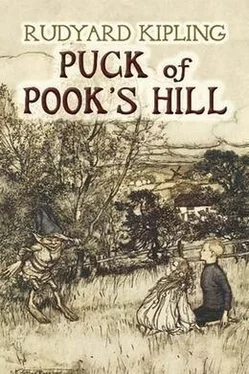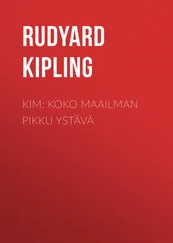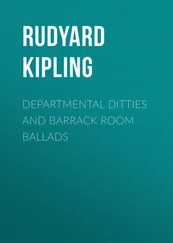Rudyard Kipling - Puck of Pook's Hill
Здесь есть возможность читать онлайн «Rudyard Kipling - Puck of Pook's Hill» весь текст электронной книги совершенно бесплатно (целиком полную версию без сокращений). В некоторых случаях можно слушать аудио, скачать через торрент в формате fb2 и присутствует краткое содержание. Год выпуска: 2014, Издательство: epubBooks Classics, Жанр: Фэнтези, на английском языке. Описание произведения, (предисловие) а так же отзывы посетителей доступны на портале библиотеки ЛибКат.
- Название:Puck of Pook's Hill
- Автор:
- Издательство:epubBooks Classics
- Жанр:
- Год:2014
- ISBN:нет данных
- Рейтинг книги:3 / 5. Голосов: 1
-
Избранное:Добавить в избранное
- Отзывы:
-
Ваша оценка:
- 60
- 1
- 2
- 3
- 4
- 5
Puck of Pook's Hill: краткое содержание, описание и аннотация
Предлагаем к чтению аннотацию, описание, краткое содержание или предисловие (зависит от того, что написал сам автор книги «Puck of Pook's Hill»). Если вы не нашли необходимую информацию о книге — напишите в комментариях, мы постараемся отыскать её.
Puck of Pook's Hill — читать онлайн бесплатно полную книгу (весь текст) целиком
Ниже представлен текст книги, разбитый по страницам. Система сохранения места последней прочитанной страницы, позволяет с удобством читать онлайн бесплатно книгу «Puck of Pook's Hill», без необходимости каждый раз заново искать на чём Вы остановились. Поставьте закладку, и сможете в любой момент перейти на страницу, на которой закончили чтение.
Интервал:
Закладка:
'Pharisees,' cried Una. 'Fairies? Oh, I see!'
'People o' the Hills,' said the Bee Boy, throwing half of his potato towards the door.
'There you be!' said Hobden, pointing at him. My boy—he has her eyes and her out–gate sense. That's what she called 'em!'
'And what did you think of it all?'
'Um—um,' Hobden rumbled. 'A man that uses fields an' shaws after dark as much as I've done, he don't go out of his road excep' for keepers.'
'But settin' that aside?' said Tom, coaxingly. 'I saw ye throw the Good Piece out–at–doors just now. Do ye believe or— do ye?'
'There was a great black eye to that tater,' said Hobden indignantly.
'My liddle eye didn't see un, then. It looked as if you meant it for—for Any One that might need it. But settin' that aside, d'ye believe or— do ye?'
'I ain't sayin' nothin', because I've heard naught, an' I've see naught. But if you was to say there was more things after dark in the shaws than men, or fur, or feather, or fin, I dunno as I'd go far about to call you a liar. Now turnagain, Tom. What's your say?'
'I'm like you. I say nothin'. But I'll tell you a tale, an' you can fit it as how you please.'
'Passel o' no–sense stuff,' growled Hobden, but he filled his pipe.
'The Marsh men they call it Dymchurch Flit,' Tom went on slowly. 'Hap you have heard it?'
'My woman she've told it me scores o' times. Dunno as I didn't end by belieftin' it—sometimes.'
Hobden crossed over as he spoke, and sucked with his pipe at the yellow lanthorn flame. Tom rested one great elbow on one great knee, where he sat among the coal.
'Have you ever bin in the Marsh?' he said to Dan.
'Only as far as Rye, once,' Dan answered.
'Ah, that's but the edge. Back behind of her there's steeples settin' beside churches, an' wise women settin' beside their doors, an' the sea settin' above the land, an' ducks herdin' wild in the diks' (he meant ditches). 'The Marsh is justabout riddled with diks an' sluices, an' tide–gates an' water–lets. You can hear 'em bubblin' an' grummelin' when the tide works in 'em, an' then you hear the sea rangin' left and right–handed all up along the Wall. You've seen how flat she is—the Marsh? You'd think nothin' easier than to walk eend–on acrost her? Ah, but the diks an' the water–lets, they twists the roads about as ravelly as witch–yarn on the spindles. So ye get all turned round in broad daylight.'
'That's because they've dreened the waters into the diks,' said Hobden. 'When I courted my woman the rushes was green—Eh me! the rushes was green—an' the Bailiff o' the Marshes he rode up and down as free as the fog.'
'Who was he?' said Dan.
'Why, the Marsh fever an' ague. He've clapped me on the shoulder once or twice till I shook proper. But now the dreenin' off of the waters have done away with the fevers; so they make a joke, like, that the Bailiff o' the Marshes broke his neck in a dik. A won'erful place for bees an' ducks 'tis too.'
'An' old,' Tom went on. 'Flesh an' Blood have been there since Time Everlastin' Beyond. Well, now, speakin' among themselves, the Marsh men say that from Time Everlastin' Beyond, the Pharisees favoured the Marsh above the rest of Old England. I lay the Marsh men ought to know. They've been out after dark, father an' son, smugglin' some one thing or t'other, since ever wool grew to sheep's backs. They say there was always a middlin' few Pharisees to be seen on the Marsh. Impident as rabbits, they was. They'd dance on the nakid roads in the nakid daytime; they'd flash their liddle green lights along the diks, comin' an' goin', like honest smugglers. Yes, an' times they'd lock the church doors against parson an' clerk of Sundays.'
'That 'ud be smugglers layin' in the lace or the brandy till they could run it out o' the Marsh. I've told my woman so,' said Hobden.
'I'll lay she didn't belieft it, then—not if she was a Whitgift. A won'erful choice place for Pharisees, the Marsh, by all accounts, till Queen Bess's father he come in with his Reformatories.'
'Would that be a Act of Parliament like?' Hobden asked.
'Sure–ly. Can't do nothing in Old England without Act, Warrant an' Summons. He got his Act allowed him, an', they say, Queen Bess's father he used the parish churches something shameful. Justabout tore the gizzards out of I dunnamany. Some folk in England they held with 'en; but some they saw it different, an' it eended in 'em takin' sides an' burnin' each other no bounds, accordin' which side was top, time bein'. That tarrified the Pharisees: for Goodwill among Flesh an' Blood is meat an' drink to 'em, an' ill–will is poison.'
'Same as bees,' said the Bee Boy. 'Bees won't stay by a house where there's hating.'
'True,' said Tom. 'This Reformatories tarrified the Pharisees same as the reaper goin' round a last stand o' wheat tarrifies rabbits. They packed into the Marsh from all parts, and they says, "Fair or foul, we must flit out o' this, for Merry England's done with, an' we're reckoned among the Images."'
'Did they all see it that way?' said Hobden.
'All but one that was called Robin—if you've heard of him. What are you laughin' at?' Tom turned to Dan. 'The Pharisees's trouble didn't tech Robin, because he'd cleaved middlin' close to people, like. No more he never meant to go out of Old England—not he; so he was sent messagin' for help among Flesh an' Blood. But Flesh an' Blood must always think of their own concerns, an' Robin couldn't get through at 'em, ye see. They thought it was tide–echoes off the Marsh.'
'What did you—what did the fai—Pharisees want?' Una asked.
'A boat, to be sure. Their liddle wings could no more cross Channel than so many tired butterflies. A boat an' a crew they desired to sail 'em over to France, where yet awhile folks hadn't tore down the Images. They couldn't abide cruel Canterbury Bells ringin' to Bulverhithe for more pore men an' women to be burnded, nor the King's proud messenger ridin' through the land givin' orders to tear down the Images. They couldn't abide it no shape. Nor yet they couldn't get their boat an' crew to flit by without Leave an' Good–will from Flesh an' Blood; an' Flesh an' Blood came an' went about its own business the while the Marsh was swarvin' up, an' swarvin' up with Pharisees from all England over, strivin' all means to get through at Flesh an' Blood to tell 'em their sore need … I don't know as you've ever heard say Pharisees are like chickens?'
'My woman used to say that too,' said Hobden, folding his brown arms.
'They be. You run too many chickens together, an' the ground sickens, like, an' you get a squat, an' your chickens die. Same way, you crowd Pharisees all in one place— they don't die, but Flesh an' Blood walkin' among 'em is apt to sick up an' pine off. They don't mean it, an' Flesh an' Blood don't know it, but that's the truth—as I've heard. The Pharisees through bein' all stenched up an' frighted, an' trying' to come through with their supplications, they nature–ally changed the thin airs an' humours in Flesh an' Blood. It lay on the Marsh like thunder. Men saw their churches ablaze with the wildfire in the windows after dark; they saw their cattle scatterin' an' no man scarin'; their sheep flockin' an' no man drivin'; their horses latherin' an' no man leadin'; they saw the liddle low green lights more than ever in the dik–sides; they heard the liddle feet patterin' more than ever round the houses; an' night an' day, day an' night, 'twas all as though they were bein' creeped up on, an' hinted at by Some One or other that couldn't rightly shape their trouble. Oh, I lay they sweated! Man an' maid, woman an' child, their nature done 'em no service all the weeks while the Marsh was swarvin' up with Pharisees. But they was Flesh an' Blood, an' Marsh men before all. They reckoned the signs sinnified trouble for the Marsh. Or that the sea 'ud rear up against Dymchurch Wall an' they'd be drownded like Old Winchelsea; or that the Plague was comin'. So they looked for the meanin' in the sea or in the clouds—far an' high up. They never thought to look near an' knee–high, where they could see naught.
Читать дальшеИнтервал:
Закладка:
Похожие книги на «Puck of Pook's Hill»
Представляем Вашему вниманию похожие книги на «Puck of Pook's Hill» списком для выбора. Мы отобрали схожую по названию и смыслу литературу в надежде предоставить читателям больше вариантов отыскать новые, интересные, ещё непрочитанные произведения.
Обсуждение, отзывы о книге «Puck of Pook's Hill» и просто собственные мнения читателей. Оставьте ваши комментарии, напишите, что Вы думаете о произведении, его смысле или главных героях. Укажите что конкретно понравилось, а что нет, и почему Вы так считаете.












